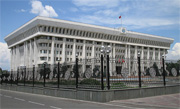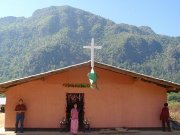.jpg) |
| (Cover photo courtesy of Africanarguments.org. Story photo courtesy of Open Doors USA) |
But now this no man’s land may be developing into a humanitarian crisis, according to NGO groups.
“The CAR has been lost in everything that is happening in Egypt and Syria so it’s not on a lot of governments’ or people’s radars or the media.... We don’t want this to turn into another Somalia,” says Jerry Dykstra with Open Doors USA.
Workers with Open Doors in CAR say locals are talking about this "Somalization" of their nation. There are some differences between the situations, but also some similarities.
Dykstra explains, “Somalia has been without a government for years and years. In CAR’s case, the shaky government was overthrown in March and there was a group called Seleka. They forced the leaders out, took over, and since that time there has been tremendous unrest among the people; a lot of violence.”
After the March coup, a new government was established on June 16. Most of the leaders are Seleka with few opposing politicians. 180,000 people have been displaced in the chaos.
International groups suspended aid to the CAR after the coup. They look at what happened in Somalia with several NGO workers killed by rebel domination over the years. Aid organizations in CAR similarly fear for their safety. But when aid was pulled out of Somalia, citizens were hit the hardest with little access to vital resources.
As order in the CAR disintegrates, reports of rapes, robbery, and torture come out. Most recently, a Seleka colonel in Nola sent soldiers to kidnap a 13-year-old girl. The colonel raped her, and soldiers assaulted her parents when they tried to intervene. A co-worker with Open Doors writes, “In the Seleka movement, soldiers are only answerable to their commander and not the president.”
Dykstra says Christians’ safety is also in jeopardy. 50% of the population in CAR is Christian and 15% are Muslim. Christian communities in CAR claim their Muslim neighbors are joining Seleka’s violent campaigns, according to Open Doors.
“It’s not like Christianity is a minority religion, but ever since the coup in March, the Muslims have increased their persecution of Christians at the expense of Christians fearing for their lives,” says Dykstra.
Somalia is 5th on Open Doors World Watch List for worst persecution of Christians. Several other African nations aren’t too far behind. Dykstra states the developing situation in the CAR raises concern. “I would think CAR would move up the list next year, and so we pray that won’t happen, that things will settle down and that Christians and Muslims will get together and respect each other’s faith.”
NGO’s have brought together leaders in Christian, Catholic, and Muslim communities to dialogue and prevent further unrest. Four imams, four pastors, and four priests are part of the initiative and will train on how to prevent conflicts. Then they will spread out to various cities and hold meetings to prevent conflict.
The Catholic clergy also sent a letter “to convey the message of peace and hopefully to implore the new leader, Michel Djotodia, to break his silence on the violence of the Seleka group and for him to say hold off and to promise not to bring Sharia law into that country,” says Dykstra.
Open Doors workers ask through Dykstra, “We need your prayers. We hope this does not turn into a wild state, a gangster state, a jungle. Pray for the future.”







